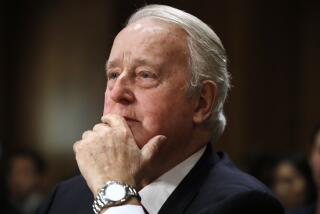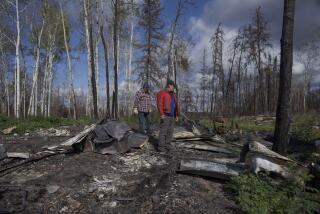Next Step : Separatist Fires Are Burning Again in Quebec : After 10 years of peace, Canada faces a language crisis that some people feel could blow the country apart. And a kind of D-Day is not far off.
MONTREAL — On a packed bus rolling through the streets of Canada’s bilingual capital, Ottawa, the driver called out, “Please move to the rear of the bus,” in heavily French-Canadian-accented English.
Out of the crowd of passengers came a loud, sarcastic retort, and a sign of the times: “Yes, move to the back and make room for French-Canadians!”
Separatism is back in Canada, after a 10-year time of peace. Even now, no bombs are going off, no effigies are being burned, no rioters block the streets--in fact, it’s hard even to find anti-English graffiti in the heart of French-speaking Montreal. Government officials are quick to argue that Canada’s current malaise is just more of the general linguistic ill will that has long plagued this country. Still, many Canadians are wondering whether this year’s language crisis will be the ultimate one, the one that blows the country apart.
Polls show that about half the population of the French-speaking province of Quebec is now interested in achieving some new political arrangement with the rest of Canada. The leader of one of Quebec’s largest labor groups, the Confederation of National Trade Unions, has recently come out for independence, harkening back to the late 1970s, when Quebec’s unionists, teachers and intellectuals pushed for what they called “sovereignty-association,” a status that would have kept Quebec economically linked to Canada while granting it political independence.
Perhaps more significant, some Quebec businessmen are even talking about outright sovereignty--not so much because they want political change as because they are tired of linguistic bickering and think a break from English Canada might help them get on with the real issues of profit and growth.
“The rest of Canada doesn’t give us any choice,” says Claude Beland, president of the Mouvement Desjardins, the largest association of credit unions in the province. “We are kicked out of Canada. That’s the way I see it.”
A D-Day of sorts will arrive on June 23, the date by which all 10 Canadian provinces are supposed to have ratified a package of constitutional amendments clarifying the relative powers of the federal and provincial governments. The amendments were intended to be conciliatory toward Quebec but instead have provoked much of today’s bitterness both in the province and in English-speaking Canada.
The package, which is called the Meech Lake Accord for the resort where it was drawn up, is the brainchild of Prime Minister Brian Mulroney, and he has mounted a tremendous 11th-hour battle for its ratification. Three provinces are holding out, however.
At the 1987 Meech Lake meeting, Quebec presented what were called its “minimal demands.” Representatives of all provinces were willing to meet them at the time, but since then, New Brunswick, Manitoba and Newfoundland have reneged and begun calling for changes in the accord. Since Quebec, having already stated its minimal demands, is left no room to maneuver, the amendments’ chance of ratification seem very unlikely today.
No one in Canada is predicting upheaval on June 24 if the package isn’t approved on the 23rd. Instead, the date is seen here as a mere milestone--albeit an important one--in the slow but inexorable unraveling of the country. Even if the accord is ratified in the end, analysts say, the debate has left deep wounds that will take much time and diplomacy to heal.
If the Meech Lake Accord does not pass, a look ahead:
* For the province of Quebec itself, the immediate reaction to the failure of Meech Lake would be shock and a deep sense of rejection by English Canada.
* For Mulroney and the Progressive Conservatives, the debate over the accord has been damaging enough; defeat would be disaster.
* Canada’s Liberal Party, which wants to run the government and may have a shot at the prime minister’s job, is poised to capitalize on Mulroney’s growing problems. But the Liberals have problems of their own.
Quebec’s main opposition party, the separatist Parti Quebecois, has printed up thousands of pamphlets for distribution this summer, describing its own, radical recipe for independence. The plan calls for a nation-state with its own constitution, tax-collection system, foreign policy and army, and for Quebec to go on using the Canadian dollar and seek minority shareholder status with the Bank of Canada. Quebec’s premier, Robert Bourassa, has taken a far more temperate view. He hails from the Liberal Party, but he has nonetheless been supporting Mulroney’s Meech Lake Accord--even though Mulroney is a Progressive Conservative. If the Meech Lake Accord were to fail, though, Bourassa would certainly feel pressure to back away from Mulroney and embrace Quebec “nationalism,” as separatism is called here, to avoid being swamped by public opinion and overtaken by the Parti Quebecois.
If the constitutional pact fails, Bourassa would at the very least feel freer than he has in the past to pass laws promoting French in the province. Such laws tend to conflict with Canada’s federal Charter of Rights and Freedoms, since they restrict English-language minority rights; as such, they outrage English-Canadians. Bourassa has so far enacted one such law, banning the use of English outdoor signs in Quebec. He is feeling the English-Canadian backlash to this day.
When Mulroney was first elected prime minister in 1984, he had two main goals: to sign a bilateral trade agreement with the United States and to achieve the ratification of the Meech Lake Accord. He succeeded in getting the trade accord only at a high political cost; Canadians have been complaining ever since that the deal sold out the nation’s sovereignty.
Now, with Meech Lake, the stakes for Mulroney are even higher. The prime minister had merely inherited the idea of a free-trade deal; he designed the Meech Lake concept, promoted it in his 1984 inaugural address and conducted the negotiations personally. If the accord goes down in flames, Mulroney’s authority, morale and ability to govern would be seriously shaken. And the blow would come at a time when Mulroney can least afford it. His approval ratings are a mere 15% to 16% these days, the lowest of any Canadian prime minister since World War II.
Even as his popular support has trickled away, Mulroney has stayed politically viable, thanks to the continued loyalty of both English-Canadian Conservatives and Quebec nationalists. But if the Meech Lake Accord is defeated, the Quebeckers will feel pressured to withdraw their support from Mulroney and rally ‘round Quebec. Last week, Mulroney’s minister of the environment, Lucien Bouchard, abandoned his prime minister: He first sent a telegram of support to the Parti Quebecois, then resigned. Two other Quebec members of Parliament broke ranks with the Progressive Conservatives last week as well.
For Canada’s Liberal Party, Mulroney’s growing problems don’t necessarily spell victory, however.
By coincidence, the Liberals will hold their convention on June 24--the day after the accord deadline--to select a new party leader. Under Canada’s parliamentary system, that leader could become Canada’s new prime minister the next time an election is called, since one must be before 1993. For now, candidate Jean Chretien, a Quebecker, looks to be a shoo-in within the Liberals.
But does that mean Chretien can capitalize on Mulroney’s problems and beat the Progressive Conservatives? Would the collapse of the Meech Lake Accord ensure a Liberal government next time around? Not necessarily.
Chretien, a traditional Liberal, stands for a strong central government. Thus, he opposes the Meech Lake Accord, which promises increased powers to the provinces. This stance puts him squarely against Mulroney--but also puts him squarely against public opinion in his own home province. If the accord is defeated, Quebeckers could hardly be expected to vote for someone who wanted it to die. And it’s hard for any political party to win in Canada without winning in Quebec.
Fears about the provincial economy, perhaps more than any other factor, frightened Quebeckers away from sovereignty when a referendum was held on the issue in 1980, with 60% of them voting against it. One study carried out at the time showed that real disposable incomes in the province would fall 5% if Quebec were to secede.
Now, though, some gray-flannel types are contending that the Quebec business class has matured and that the province could go it alone without marring its international credit rating. Merrill Lynch has sent a report stating as much to its clients. On the downside, political uncertainty never sits well with investors. And economists point out that if Quebec were to let out all the stops and opt for separation, the new nation-state would find itself relying on imported fossil fuels (it now buys gasoline on the cheap from the western provinces) and heavily dependent on boom-and-bust-prone natural resources exports.
Meech Lake Accord at a Glance
The secessionist debate in Canada revolves around something called the Meech Lake Accord, a 1987 package of constitutional amendments that must be ratified by all 10 provinces. In a nutshell, the accord:
Recognizes the linguistic duality of Canada and points out that within Canada, Quebec constitutes a “distinct society”.
Permits the provinces to opt out of certain kinds of shared-cost federal spending programs and requires the federal government to pay “reasonable compensation” to provinces that choose to do so.
Gives provinces the right to negotiate their own immigration policies with the federal government (Quebec has already reached such an arrangement, at an administrative level).
Puts the Supreme Court under the constitution and gives the provinces the right to nominate justices to fill vacancies; Quebec would have three of the nine justices. The accord also gives provinces a say in the selection of Canada’s appointed Senate.
Changes the formula by which Canada amends its constitution.
Profile of a Troubled Province Labor force (1989): 3.3 million Unemployment rate: 9.3% Personal income per capita (1987): $14,621 % of Canadian average: 95.4% Gross Domestic Product (1989): $96.8 billion % of Canada’s GDP: 24.0% Farm cash receipts (1989): $3.1 billion Electricity generated (1988): 149,004,914 MWh Mineral production (1988): $2.28 billion Value of construction (1988): $17.7 billion Value of logging shipments (1986): $932 million Value of manufacturing shipments (1988): $60.9 billion Total area: 636,400 sq. miles Total population: 6.7 million (July, 1989) Languages: French, English, Multiple, Other All economic figures in American doillars. Source: 1990 Corpus Almanac and Canadian Sourcebook
More to Read
Sign up for Essential California
The most important California stories and recommendations in your inbox every morning.
You may occasionally receive promotional content from the Los Angeles Times.










